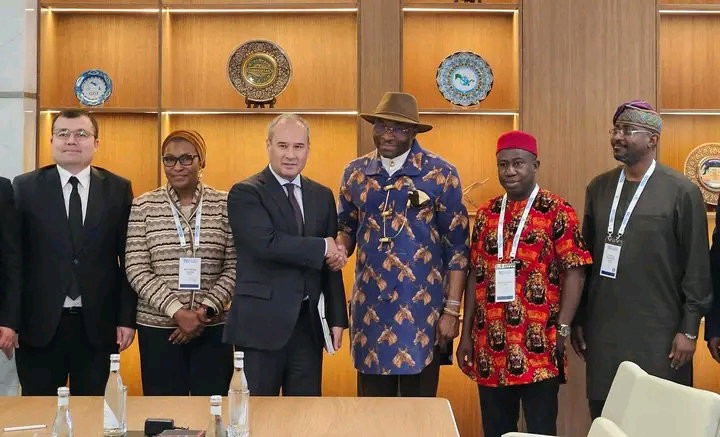𝐀 𝐂𝐚𝐥𝐥 𝐅𝐨𝐫 𝐏𝐞𝐚𝐜𝐞: 𝐍𝐢𝐠𝐞𝐫𝐢𝐚'𝐬 𝐂𝐨𝐦𝐦𝐢𝐭𝐦𝐞𝐧𝐭 𝐓𝐨 𝐓𝐡𝐞 𝐈𝐬𝐫𝐚𝐞𝐥-𝐏𝐚𝐥𝐞𝐬𝐭𝐢𝐧𝐞 𝐂𝐨𝐧𝐟𝐥𝐢𝐜𝐭 𝐑𝐞𝐬𝐨𝐥𝐮𝐭𝐢𝐨𝐧
........... 𝒂𝒔 𝑹𝒕 𝑯𝒐𝒏 𝑩𝒆𝒏𝒋𝒂𝒎𝒊𝒏 𝑲𝒂𝒍𝒖 𝒎𝒂𝒌𝒆𝒔 𝒂 𝒕𝒊 𝒎𝒆𝒍𝒚 𝒓𝒆𝒎𝒊𝒏𝒅𝒆𝒓 𝒐𝒇 𝒕𝒉𝒆 𝒑𝒐𝒘𝒆𝒓 𝒐𝒇 𝒅𝒊𝒂𝒍𝒐𝒈𝒖𝒆 𝒊𝒏 𝒓𝒆𝒔𝒐𝒍𝒗𝒊𝒏𝒈 𝒄𝒐𝒏𝒇𝒍𝒊𝒄𝒕
In the heart of Geneva, the 149th Inter-Parliamentary Union (IPU) Assembly recently convened, bringing together global leaders and lawmakers to discuss pressing international issues.
Among them was Nigeria's Deputy Speaker of the House of Representatives, Rt Hon Benjamin Kalu, who stood firm in his commitment to resolving one of the most enduring conflicts of our time: the Israel-Palestine conflict.
His words resonated with a clarion call for justice, self-determination, and mutual respect—principles that underpin the aspirations of both nations.
Rt Hon Kalu's address was not merely a reiteration of Nigeria's longstanding position; it was a profound acknowledgment of the unique role that parliamentary diplomacy can play in fostering dialogue and understanding.
In a world where conflicts often escalate into violence and hostility, the importance of dialogue cannot be overstated.
Rt Hon Kalu emphasized that sustainable peace cannot be achieved through the barrel of a gun but rather through committed dialogue that preserves human dignity for all individuals involved.
This sentiment is particularly poignant in the context of the Israel-Palestine conflict, where decades of strife have led to immense suffering on both sides.
Nigeria's advocacy for a peaceful resolution is rooted in its alignment with internationally recognized frameworks for peace.
The Deputy Speaker reiterated Nigeria's support for the two-state solution, a vision that aims for the establishment of a sovereign and independent State of Palestine coexisting peacefully with the State of Israel.
This framework, while challenging to implement, offers a pathway toward reconciliation and mutual respect—a necessary foundation for any lasting peace.
Rt Hon Kalu's remarks also underscored the critical role of the international community, particularly United Nations Member States, in this endeavor.
He urged these nations to renew their commitment to ending the occupation of Palestinian territories and to support the establishment of a Palestinian state.
This call to action is vital; it highlights the need for collective efforts and political will to address the root causes of the conflict.
The complexities of the situation require not just acknowledgment, but also a concerted effort to create an environment conducive to peace.
The Deputy Speaker's commitment to human rights and good governance is a significant aspect of Nigeria's approach to the Israel-Palestine conflict.
He assured that Nigeria, through its parliament, will continue to advocate for democratic institutions that benefit both Palestinians and Israelis.
This commitment reflects a broader understanding that peace is not merely the absence of conflict but the presence of justice and equity.
The rights and aspirations of both peoples must be safeguarded, as any resolution that neglects one side will inevitably lead to further unrest.
In acknowledging the challenges that lie ahead, Rt Hon Kalu's message was one of hope. He recognized that the road to peace is fraught with obstacles, yet he firmly believes that a resolution to this longstanding conflict is achievable.
This optimism is crucial; it serves as a reminder that even the most entrenched disputes can be resolved through patience, dialogue, and mutual respect.
The Deputy Speaker's expression of solidarity with all those seeking peace and justice in the Middle East is a testament to Nigeria's readiness to contribute to a lasting resolution.
As we reflect on Rt Hon Benjamin Kalu's address, it becomes clear that the Israel-Palestine conflict is not merely a regional issue but a global concern that demands the attention and action of the international community.
The principles of justice, self-determination, and mutual respect are universal values that resonate beyond borders.
Nigeria's commitment to these principles, as articulated by its Deputy Speaker, reinforces the idea that parliamentary diplomacy can bridge divides and foster understanding.
Let me conclude by saying that the call for peace articulated by Rt Hon Benjamin Kalu at the IPU Assembly is a timely reminder of the power of dialogue in resolving conflicts.
Nigeria's unwavering commitment to advocating for a peaceful resolution to the Israel-Palestine conflict is not just a political stance; it is a moral imperative.
As the world grapples with the complexities of this conflict, the voices of leaders like Rt Hon Benjamin Kalu are essential in steering the discourse towards understanding and reconciliation.
Only through collective efforts can we hope to achieve a future where both Israelis and Palestinians can coexist in peace, dignity, and mutual respect.
The journey may be long and arduous, but with political will and a commitment to dialogue, a brighter future is indeed possible.
𝓘𝔂𝓴𝓮 𝓜𝓫𝓪
𝙎.𝙇.𝘼 𝘿𝙚𝙥𝙪𝙩𝙮 𝙎𝙥𝙚𝙖𝙠𝙚𝙧 𝙃.𝙊.𝙍





Comments
Post a Comment
For advert placing, call 08024114163